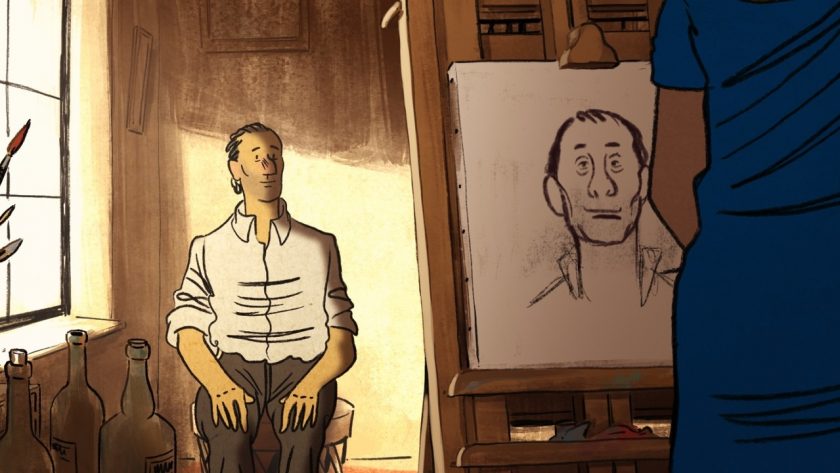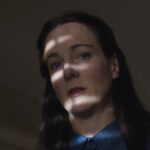French Film Festival UK celebrates its 29th year with a programme of thirty-seven films from celebrated and debut film makers.
Sophiya Sian reviews an animated drama about a gendarme recalling his encounter with the Catalan artist Josep Bartolí in a French concentration camp after the Spanish Civil War.
Shuffles of feet, cold breaths, haunting melodies, and three hunched silhouettes moving through the grey brushstrokes of a winter night. There is no dramatic action, no intricate animation, no dialogue. Frame by frame, we sit and we wait in silent stills of bleak darkness, until, colour is let in. A gentle red wash soaking the bodies of the three men at the foot of a French tombstone triggers the first speech of the film:
“Motherfuckers.”
This blunt opening establishes (but by no means defines) the confident tone taken by French editorial cartoonist, and now award-winning director, Aurel. The director captures the vast life of Spanish painter, cartoonist, and writer, Josep Bartolí, who lived for almost a century. In just seventy-four minutes, we are immersed into a diverse, textured world of illustration and sound, which allow for us to travel across countries, languages, and generations to grieve but also to smile with Josep and the characters of his life — some real, some fictional.
In his debut feature, Aurel masterfully sheds light onto a blind spot in French history without leaving his audience in the depths of despair for too long. We begin in 1939 France, where Josep is one of the many Spanish refugees to flee Franco’s dictatorship. However, he finds himself locked in a concentration camp as soon as he sets foot in the country he had hoped to find freedom in. Give it a few minutes, and the sepia vignettes of France on the edge of war transition to the colourful, motion-filled present-day New York, where teenager Valentin isn’t happy about being stuck with his Grandad for the day. Soon, they both move past their generational differences and bond over a shared appreciation of drawing, an appreciation that unlocks the Grandad’s fading memories of his scarring time as a Gendarme in the camps and of the friendships that blossomed there.
Now, as an animator and illustrator, I went into this film prepared for beautiful, if not dark and melancholic, visuals of tragic history (the kind seen in acclaimed dramatic animations such as Persepolis (2007). So, when I took my seat, I was a little surprised to see a family with two young children sitting in front of me, ready to spend their Saturday evening being reminded of the gloom of inhumanity. I was also surprised when I found myself laughing aloud with them and the rest of the audience in many bright moments of joy and gentle humour. As the film’s opening suggests, Josep (2020) does not shy away from the shadows of French history, but nor does it deny us of the eternal lights of friendship, future, and meaning that can outlast us all through the simple human instinct of telling stories and drawing pictures.
The stories illustrated here are not one solely of Josep Bartollí — the French concentration camps and the disproportionate powers within them — but the stories of illustration itself and its power to keep memory and visions alive, even while the brain begins to forget and the eyes go blind.
In moments of pure suffering, we shift from the warmer, yellow tones of memory to frantic, monochromatic, and caricaturistic sketches, portraying the suffering that surrounds Josep. Despite being depicted through the simplistic lines of newspaper-style illustration, one particular scene carried emotional weight even more effectively than some hyper-realistic approaches to on-screen violence. A set of painfully slow stills sketched out the sadistic brutality of the French officers, where the minimalistic style forced me and the rest of the audience to pause and sit with the characters, rather than indulge in the spectacle of violence that can overshadow dramatic retellings of history.
Aurel intentionally manages the sensory experiences of the viewer, often employing layered sounds when movement or visual detail is lacking. Once Josep finally leaves the camp, we are therefore able to fully appreciate the vibrancy of his more liberated reality with the bursting colours of Mexico, and his iconically vibrant partner Frida Kahlo, whose words underpin the entire film:
“The day that you finally let colour in, you’ll have tamed your fear.“
We leave this delicately handled survey of Bartolí’s expansive life in modern-day New York where the real protagonist, the drawings themselves, are brought to a heartwarming full circle.
Josep deserves its place among the Cannes 73 Official selection, as it is refreshing proof of commitment to a substance above all else — the style inevitably following. The film finds its voice among the fast-paced, sometimes overstimulating, world of slick animation where style, though captivating, can often be for style’s sake. Director Aurel has spoken about how low a budget this film had, and how little animation experience he had — preferring to call it a ‘drawn film’ rather than an ‘animation’ due to its unusual lack of motion. Yet at its root, animation means both ‘life’ and ‘to breathe’. On those terms, even if involuntarily, Josep honours the medium by breathing life into Bartolí’s static work and the erased histories they illustrate.
Watch the trailer for Josep here:




